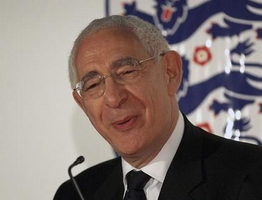
FA chairman David Bernstein called Terry on Friday morning to inform him of the board's decision, which came 48 hours after it was confirmed his trial for allegedly racially abusing QPR defender Anton Ferdinand would be held on July 9, after Euro 2012. Terry denies the charge.
"I think the decision was inevitable and I'm very pleased and a bit relieved David Bernstein has taken that decision," Triesman told Radio Five Live's Sportsweek.
"The only anxiety I have is it's taken rather too long to get to this point. The truth is you have a serious allegation, not proved yet of course. But in most organisations it would mean you simply could not go on as you were for this length of time.
"I sometimes think football is in a bit of a bubble and the things that happen in the rest of the world don't apply to football. Well, I'm afraid they do. If someone is charged with what is a significant criminal offence, I think that is probably the moment that almost every organisation would act.
"I suspect most people when faced with this kind of difficulty do conclude they should stand down and clear their name. That is a significant preoccupation."
While supporting the principle of innocent until proven guilty, Triesman pointed to the example of former energy secretary Chris Huhne, who left the cabinet on Friday after learning he faces a charge of perverting the course of justice over a 2003 speeding case, a claim he denies.
"One thing that is clear about John Terry is he's a fine footballer and he's obviously, in most senses, able to get on with his job," Triesman added.
"But in a more general sense, most people would say clearing my name is the most important obligation. Although there has not been a hearing and not been a verdict, the FA itself has to look after the interests of football more widely.
"We've got to the point where there is not just potential disruption in the dressing room, but a significant charge that is going to be heard in court."
Source: PA
Source: PA